Workshop: How to build a health commons approach to pandemic preparedness and response
16 January 2023, 1:00 pm–3:00 pm
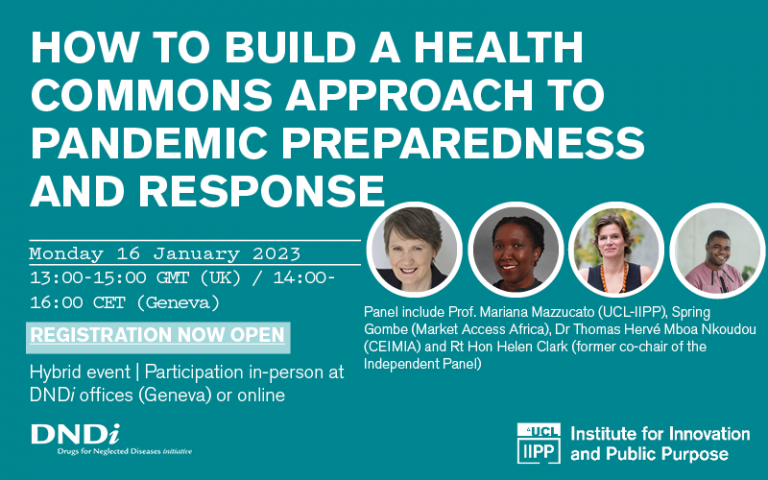
This is a hybrid event, co-hosted by DNDi, UCL Institute for Innovation and Public Purpose (IIPP) and Friends of the Independent Panel.
Event Information
Open to
- All
Organiser
-
DNDi
Date: 16 January 2023
Time: 13:00 - 15:00 pm (GMT) UK / 14:00 - 16:00 pm (CET) Geneva
The aim of this workshop is to start to identify the key elements of a collective framework to organize, finance, and coordinate health innovation by public and private sectors. It will discuss some of the latest economic thinking on collective ownership, explore current examples of managing collective knowledge to develop vaccines and treatments for PPR and help identify areas where policy makers can and should act to increase our collective capabilities for the development and equitable delivery of health technologies for pandemic preparedness and response.
Hybrid event, co-hosted by DNDi, UCL Institute for Innovation and Public Purpose, & Friends of The Independent Panel. Participation in-person at DNDi offices in Geneva or online. To confirm in person attendance please contact DNDi rcrockett@dndi.org. If attending in person, please arrive at the DNDi offices promptly at 13:45 CET (Geneva) for a 14:00 start.
Agenda
Moderated by Spring Gombe, Partner and Principal, Public Affairs Practice, Market Access Africa.
- Introduction and framing by Rt Hon Helen Clark, former co-chair of the Independent Panel
Keynote | Health for All: From a Public Good to a Common Good approach
- Professor Mariana Mazzucato, Institute for Innovation and Public Purpose (IIPP), UCL and Chair of the WHO Council on the Economics of Health for All: “Health for All: moving from market fixing public goods to market shaping around the common good” Initiatives to deliver common good for health
Initiatives to deliver common good for health
- Chan Park, Medicines Patent Pool: Technology sharing and managing collective knowledge within the WHO mRNA technology transfer Hub
- Annette Von Delft, University of Oxford: Knowledge sharing within the Moonshot consortium
- Thomas Hervé Mboa Nkoudou, Researcher at CEIMIA and Founder of the Mboa Lab: Using emerging technologies for improving NTDs diagnostics: Open Science principles applied to AI and local manufacturing for medical labs in Africa
Respondents
- Suerie Moon, Graduate Institute
- Benjamin Coriat, En Communs, Université Paris Sorbonne
- Sangeeta Shashikant, Third World Network
- Viviana Munoz Tellez, South Centre
Discussion
Closing remarks
- Els Torreele, Friend of the Independent Panel and IIPP
- Luis Pizarro, DNDi
About the Speakers
Prof Mariana Mazzucato
Founding Director and Professor in the Economics of Innovation and Public Value at UCL Institute for Innovation and Public Purpose
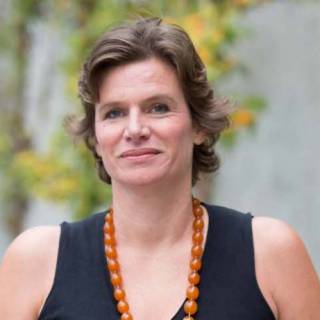
She is the author of three highly-acclaimed books: The Entrepreneurial State: Debunking Public vs. Private Sector Myths (2013), The Value of Everything: Making and Taking in the Global Economy (2018) and most recently Mission Economy: A Moonshot Guide to Changing Capitalism (2021). She advises policymakers around the world on innovation-led inclusive and sustainable growth. Her current roles include being Chair of the World Health Organization’s Economic Council on Health for All and a member of the South African President’s Economic Advisory Council, the Scottish Government’s Council of Economic Advisors, and the United Nations High-level Advisory Board (HLAB) on Economic and Social Affairs, among others. More about Prof Mariana Mazzucato
Dr Thomas Hervé Mboa Nkoudou
Researcher at CEIMIA
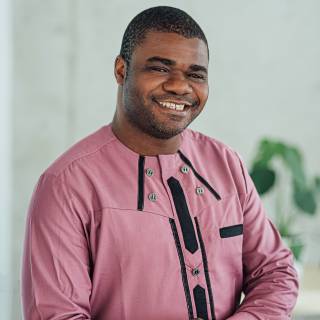
In a practical way, Thomas Mboa founded the Mboalab, a collaborative space whose mission is to catalyse local sustainable development through Open Science. The main activities of the Mboalab are therefore oriented towards: biotechnology, smart technologies (IoT, electronics), digital manufacturing (3D printing, prototyping) and artificial intelligence applied to health. You can learn more about Thomas Mboa's work here. More about Dr Thomas Hervé Mboa Nkoudou
Spring Gombe
Partner and Principal at Market Access Africa
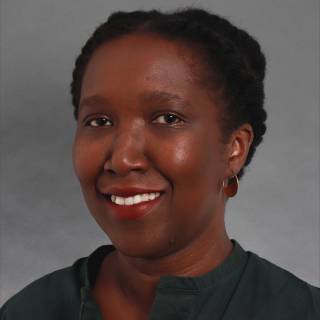
Bringing 20+ years’ experience to MAA, Spring was previously Programme Manager, Technology Access Partnership at the UN Technology Bank for the Least Developed Countries, a Senior Policy Advocacy Manager with the Drugs for Neglected Diseases initiative (DNDi) and a Senior Health Policy Analyst with the Knowledge Ecology International, for whom her work focused on neglected tropical diseases and diseases of epidemic potential.
Her other work experiences include advocating for access to health technologies with civil society organizations, including MSF Access Campaign and Oxfam International. Spring holds a Bachelor of Science in Biological Sciences from Cornell University and a Master of Arts in Global Health Policy from the Gallatin School of Individualized Study, New York University. More about Spring Gombe
Helen Clark
Co-chair of The Independent Panel for Pandemic Preparedness and Response, and former Prime Minister of New Zealand at The Independent Panel for Pandemic Preparedness and Response
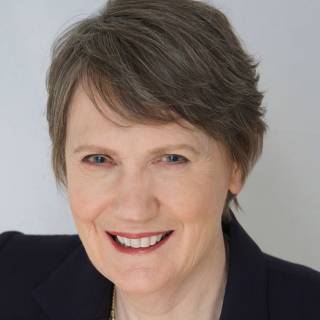
Throughout her tenure as Prime Minister and as a Member of Parliament over 27 years, Helen Clark engaged widely in policy development and advocacy across the international affairs, economic, social, environmental, and cultural spheres. She advocated strongly for a comprehensive programme on sustainability for New Zealand and for tackling the challenges of climate change. She was an active leader of her country’s foreign relations, engaging in a wide range of international issues.
In April 2009, Helen Clark became Administrator of the United Nations Development Programme. She was the first woman to lead the organisation, and served two terms there. At the same time, she was Chair of the United Nations Development Group, a committee consisting of all UN funds, programmes, agencies, and departments working on development issues. As Administrator, she led UNDP to be ranked the most transparent global development organisation. She completed her tenure in April 2017. More about Helen Clark
 Close
Close

